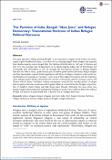The partition of India, Bengali “new Jews,” and refugee democracy : transnational horizons of Indian refugee political discourse
Abstract
This essay advocates “refugee political thought” as an autonomous category which needs to be centre-staged in global intellectual history. I concretise this by studying Bengali Hindu refugees who migrated from Muslim-majority eastern Bengal (after the Partition of British India in 1947 part of Pakistan, and after 1971, the sovereign state of Bangladesh) to the Hindu-majority Indian state of West Bengal, and occasionally their descendants as well. By studying the transnational horizons of Bengali refugees from the late 1940s to today, I posit them as part of modern global intellectual history. Bengali refugees and their descendants connected their experiences with those of refugees elsewhere in the world, seeing themselves, for example, as “new Jews.” Later, some of them aligned themselves with the Palestinian cause. Refugee politics became enmeshed with Cold War revolutionary currents. European, Soviet, and Chinese Marxist theory—and latent Lockean assumptions—propelled the everyday politics of refugee land occupation. Marxism, sometimes with Hegelian inflection, nourished the East Bengali-–origin founders of Subaltern Studies theory and Dalit (lower-caste) thought. Ultimately, this essay shows how Bengali refugees instrumentalised transnational thinking to produce new models of democratic political thought and practice in postcolonial India. I describe this as “refugee democracy.”
Citation
Banerjee , M 2022 , ' The partition of India, Bengali “new Jews,” and refugee democracy : transnational horizons of Indian refugee political discourse ' , Itinerario , vol. 46 , no. 2 , pp. 283-303 . https://doi.org/10.1017/S0165115322000092
Publication
Itinerario
Status
Peer reviewed
ISSN
0165-1153Type
Journal article
Collections
Items in the St Andrews Research Repository are protected by copyright, with all rights reserved, unless otherwise indicated.
Related items
Showing items related by title, author, creator and subject.
-
Refugee law and states' obligations
Walker, Jessica (University of St Andrews, 2016-06-23) - ThesisThe current legal definition of the term ‘refugee’ fails to recognise the centrality of refugees’ hardship and in doing so draws morally arbitrary distinctions between different types of refugees. I use Wiggins’ 1987 paper ... -
Hope unexpected : an account of the Lebanese Christians' encounter with Syrian refugees
Gourlay, Marjorie G. (University of St Andrews, 2016-06) - ThesisThis research explores the place of the Church in Lebanon and its response to the present Syrian refugee crisis. By means of interviews with a small number of Christian leaders in Beirut, this study narrates a current ... -
UK national print media coverage of sexual and gender-based violence (SGBV) against refugee women in Syrian refugee camps
Özdemir, Özlem (Centre for Syrian Studies, School of International Relations, University of St Andrews, 2015-11-16) - Journal articleThe vulnerability of Syrian refugee women does not draw the public attention it deserves. In this regard, media coverage thus has an important role to illustrate these women’s vulnerable situation and to create public ...

